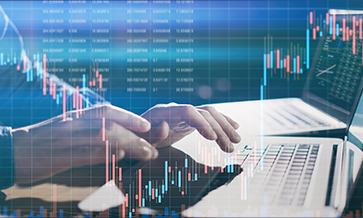An Introduction to Online Currency Trading
Remember that time you were on holiday in Thailand and needed to exchange your dollars for Thai baht? You thought, “This exchange rate is crazy! I wonder if I could make money from this?” Well, you’re not alone. Millions of people around the world are now trading currencies online, hoping to capitalize on fluctuations in exchange rates. While it might seem complicated, the process is surprisingly accessible, even for beginners.

Image: reddcommunity.org
This guide will walk you through the basics of online currency trading, from understanding the market to choosing a reputable broker and developing your trading strategies. We’ll explore the world of Forex (Foreign Exchange) and provide essential tips to help you navigate this dynamic market with confidence. Whether you’re looking to diversify your investment portfolio or simply want to learn more about how the global currency market works, this guide will equip you with the knowledge you need to take your first steps into the exciting world of online currency trading.
Understanding the Forex Market
What is Forex?
Forex, short for Foreign Exchange, is the global marketplace where currencies are bought and sold. It’s the world’s largest financial market, with trillions of dollars changing hands every day. Unlike the stock market, which deals with individual companies, Forex focuses entirely on the exchange rates between different national currencies.
Why Trade Forex?
There are several reasons why people choose to trade Forex:
- **24/5 Availability:** Unlike the stock market, which has specific trading hours, Forex operates around the clock, offering ample opportunities to trade.
- **High Liquidity:** Due to its massive size, the Forex market is highly liquid, meaning you can easily enter and exit trades without significantly impacting the price.
- **Leverage:** Forex trading allows you to use leverage, meaning you can control a larger position in the market than your initial investment would normally allow. This can amplify both your potential profits and losses, so it’s crucial to understand risk management.
- **Low Entry Cost:** Typically, a small initial investment is required to start trading Forex, making it accessible to both novice and seasoned traders.

Image: www.topicsupply.com
Currency Pairs
Forex trading involves buying one currency and selling another simultaneously. These currency combinations are known as currency pairs. The most popular currency pairs include:
- EUR/USD (Euro/US Dollar)
- USD/JPY (US Dollar/Japanese Yen)
- GBP/USD (British Pound/US Dollar)
- USD/CHF (US Dollar/Swiss Franc)
- AUD/USD (Australian Dollar/US Dollar)
Factors Influencing Currency Exchange Rates
Several factors can influence the exchange rate between two currencies, including:
- Economic Data: Economic indicators, like GDP, inflation, and interest rates, can have a significant impact on currency values. A strong economy typically translates to a stronger currency.
- Political Events: Political instability or major policy changes can significantly affect currency exchange rates. Uncertainty often leads to currency depreciation.
- Central Bank Intervention: Central banks can manipulate exchange rates by buying or selling their own currency in the market.
- Market Sentiment: Investor confidence and market speculation can also drive currency fluctuations. If traders believe a currency is likely to appreciate, they’ll buy, driving the price up, and vice versa.
Essential Tips for Trading Forex
Choose a Reputable Broker
The first step to trading Forex is selecting a reliable and regulated broker. Look for a broker with a strong reputation, transparent fee structure, and a user-friendly trading platform.
Start Small & Learn the Ropes
It’s crucial to start with a small initial investment and gradually increase your stake as you gain experience. Avoid overtrading and limit your losses by implementing a stop-loss order, which automatically closes your trade if the price moves against you by a predetermined amount.
Develop a Trading Strategy
Don’t trade based on emotions or gut feelings. Instead, rely on a well-defined trading strategy that considers market trends, technical indicators, and risk management.
Practice with a Demo Account
Before risking real money, practice with a demo account provided by your broker. This allows you to test your trading strategies without any financial risk.
Stay Informed & Be Patient
Keep abreast of upcoming economic events and news affecting Forex markets. Be patient, as consistent profits in trading take time, discipline, and learning.
Manage Your Risk
Risk management is crucial in Forex trading. Never risk more than you can afford to lose. Employ stop-loss orders and position sizing techniques to limit your potential losses.
Frequently Asked Questions (FAQ)
Q: Is Forex trading right for me?
Forex trading can be suitable for those who are comfortable with taking calculated risks and have the time and dedication to learn the intricacies of the market. It’s important to conduct thorough research and understand the inherent risks involved before investing.
Q: How do I choose a Forex broker?
Choose a regulated broker with a proven track record, transparent fee structure, user-friendly trading platform, and excellent customer support.
Q: What is leverage, and how does it work?
Leverage allows you to control a larger position in the market than your initial investment would normally permit. It can amplify both your potential profits and losses, making it essential to understand risk management.
Q: How can I learn more about Forex trading?
There are tons of resources available for learning about Forex trading, including online courses, books, articles, and Forex forums.
Trading Currency Online
Conclusion
Trading currency online can be a challenging yet potentially lucrative endeavour. By understanding the intricacies of the Forex market, implementing sound risk management practices, and developing a robust trading strategy, you can increase your chances of success. This guide has provided a foundation for your journey into the world of online currency trading, but remember, continued learning and practice are essential for navigating this dynamic market.
Are interested in learning more about currency trading? Share your thoughts and questions in the comments below!







